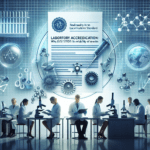

### ISO/IEC 17025: The Foundation for Laboratory Accreditation
In the world of quality and reliability, the ISO/IEC 17025 standard plays a crucial role, especially for testing laboratories operating across various sectors, from textiles to industry, food safety, and information and communication technology (ICT). This standard not only establishes the requirements for competence and impartiality of laboratories but is also essential for ensuring the reliability of test results, a vital aspect for accreditation and certification in different fields.
### What is Accreditation?
It’s important to clarify the difference between the terms “accreditation” and “certification.” While certification attests that a product or service meets specific regulatory requirements, accreditation is a procedure through which an entity formally recognizes the competence of a testing or calibration organization. This process enhances the credibility and reliability of results obtained from accredited laboratories, which are, in turn, subjected to thorough checks by third parties to ensure compliance with applicable standards.
### Structure of the ISO/IEC 17025 Standard
The ISO/IEC 17025 standard is divided into five main parts:
1. **General Requirements**: Concern the management of impartiality and confidentiality.
2. **Structural Requirements**: Address organizational structure and management responsibilities.
3. **Resource Requirements**: Focus on personnel and infrastructure management.
4. **Process Requirements**: Cover activities such as method validation and record management.
5. **Management Requirements**: Relate to the documentation of the management system and internal audits.
### Impartiality and Confidentiality: Essential for Credibility
Impartiality is a cornerstone principle of the ISO/IEC 17025 standard. It requires that laboratory activities be conducted objectively, without conflicts of interest that could compromise integrity. For example, in the context of safety assessments, evaluators should not be involved in the development of the products they are assessing.
Similarly, confidentiality is a crucial issue. Laboratories are required to protect sensitive information obtained during testing. This responsibility implies that evaluators must sign non-disclosure agreements to ensure that information remains confidential and is used solely for reporting purposes.
### Competence of Evaluators
The competence of evaluators has a direct impact on the quality of test results. The ISO/IEC 17025 standard emphasizes the importance of a continuous training process for evaluators, which includes documenting and reviewing their competencies. Furthermore, ISO/IEC TS 23532-1 defines specific standards that evaluators must meet to operate within the context of safety assessments. Their training should include in-depth knowledge of the principles of Common Criteria and relevant IT technologies.
### Adapting the Standard for Security Assessments and European Certification
With the introduction of European certification based on Common Criteria (EUCC), laboratory accreditation becomes even more complex. ISO/IEC 17025 must be integrated with specific requirements to address the needs of this European scheme. For instance, laboratories must implement processes to monitor compliance and manage composite assessments, which calls for a higher level of organization and competence.
This integration is crucial, considering that accreditation for high-level assessments requires additional requirements that must be met to ensure the quality of results and the safety of ICT products.
### Conclusion
The ISO/IEC 17025 standard represents a foundational framework for ensuring the quality and reliability of laboratory testing processes, thereby significantly contributing to the overall integrity of various sectors.


